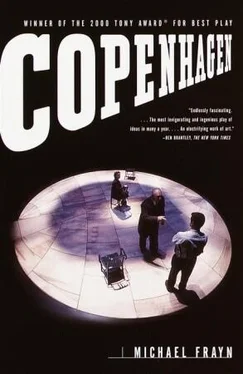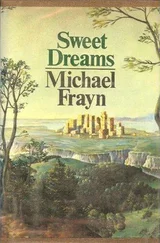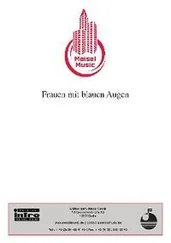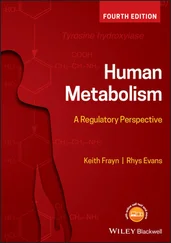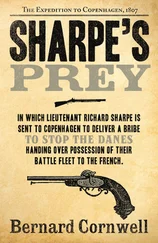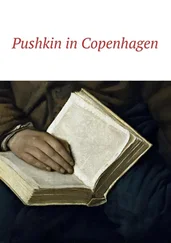Margrethe But what exactly had Heisenberg said? That’s what everyone wanted to know, then and forever after.
Bohr It’s what the British wanted to know, as soon as Chadwick managed to get in touch with me. What exactly did Heisenberg say?
Heisenberg And what exactly did Bohr reply? That was of course the first thing my colleagues asked me when I got back to Germany.
Margrethe What did Heisenberg tell Niels — what did Niels reply? The person who wanted to know most of all was Heisenberg himself.
Bohr You mean when he came back to Copenhagen after the war, in 1947?
Margrethe Escorted this time not by unseen agents of the Gestapo, but by a very conspicuous minder from British intelligence.
Bohr I think he wanted various things.
Margrethe Two things. Food-parcels …
Bohr For his family in Germany. They were on the verge of starvation.
Margrethe And for you to agree what you’d said to each other in 1941.
Bohr The conversation went wrong almost as fast as it did before.
Margrethe You couldn’t even agree where you’d walked that night.
Heisenberg Where we walked? Faelled Park, of course. Where we went so often in the old days.
Margrethe But Faelled Park is behind the Institute, four kilometres away from where we live!
Heisenberg I can see the drift of autumn leaves under the street-lamps next to the bandstand.
Bohr Yes, because you remember it as October!
Margrethe And it was September.
Bohr No fallen leaves!
Margrethe And it was 1941. No street-lamps!
Bohr I thought we hadn’t got any further than my study. What I can see is the drift of papers under the reading-lamp on my desk.
Heisenberg We must have been outside! What I was going to say was treasonable. If I’d been overheard I’d have been executed.
Margrethe So what was this mysterious thing you said?
Heisenberg There’s no mystery about it. There never was any mystery. I remember it absolutely clearly, because my life was at stake, and I chose my words very carefully. I simply asked you if as a physicist one had the moral right to work on the practical exploitation of atomic energy. Yes?
Bohr I don’t recall.
Heisenberg You don’t recall, no, because you immediately became alarmed. You stopped dead in your tracks.
Bohr I was horrified.
Heisenberg Horrified. Good, you remember that. You stood there gazing at me, horrified.
Bohr Because the implication was obvious. That you were working on it.
Heisenberg And you jumped to the conclusion that I was trying to provide Hitler with nuclear weapons.
Bohr And you were!
Heisenberg No! A reactor! That’s what we were trying to build! A machine to produce power! To generate electricity, to drive ships!
Bohr You didn’t say anything about a reactor.
Heisenberg I didn’t say anything about anything! Not in so many words. I couldn’t! I’d no idea how much could be overheard. How much you’d repeat to others.
Bohr But then I asked you if you actually thought that uranium fission could be used for the construction of weapons.
Heisenberg Ah! It’s coming back!
Bohr And I clearly remember what you replied.
Heisenberg I said I now knew that it could be.
Bohr This is what really horrified me.
Heisenberg Because you’d always been confident that weapons would need 235, and that we could never separate enough of it.
Bohr A reactor — yes, maybe, because there it’s not going to blow itself apart. You can keep the chain reaction going with slow neutrons in natural uranium.
Heisenberg What we’d realised, though, was that if we could once get the reactor going …
Bohr The 238 in the natural uranium would absorb the fast neutrons …
Heisenberg Exactly as you predicted in 1939—everything we were doing was based on that fundamental insight of yours. The 238 would absorb the fast neutrons. And would be transformed by them into a new element altogether.
Bohr Neptunium. Which would decay in its turn into another new element …
Heisenberg At least as fissile as the 235 that we couldn’t separate …
Margrethe Plutonium.
Heisenberg Plutonium.
Bohr I should have worked it out for myself.
Heisenberg If we could build a reactor we could build bombs. That’s what had brought me to Copenhagen. But none of this could I say. And at this point you stopped listening. The bomb had already gone off inside your head. I realised we were heading back towards the house. Our walk was over. Our one chance to talk had gone forever.
Bohr Because I’d grasped the central point already. That one way or another you saw the possibility of supplying Hitler with nuclear weapons.
Heisenberg You grasped at least four different central points, all of them wrong. You told Rozental that I’d tried to pick your brains about fission. You told Weisskopf that I’d asked you what you knew about the Allied nuclear programme. Chadwick thought I was hoping to persuade you that there was no German programme. But then you seem to have told some people that I’d tried to recruit you to work on it!
Bohr Very well. Let’s start all over again from the beginning. No Gestapo in the shadows this time. No British intelligence officer. No one watching us at all.
Margrethe Only me.
Bohr Only Margrethe. We’re going to make the whole thing clear to Margrethe. You know how strongly I believe that we don’t do science for ourselves, that we do it so we can explain to others …
Heisenberg In plain language.
Bohr In plain language. Not your view, I know — you’d be happy to describe what you were up to purely in differential equations if you could — but for Margrethe’s sake …
Heisenberg Plain language.
Bohr Plain language. All right, so here we are, walking along the street once more. And this time I’m absolutely calm, I’m listening intently. What is it you want to say?
Heisenberg It’s not just what I want to say! The whole German nuclear team in Berlin! Not Diebner, of course, not the Nazis — but Weizsäcker, Hahn, Wirtz, Jensen, Houtermanns — they all wanted me to come and discuss it with you. We all see you as a kind of spiritual father.
Margrethe The Pope. That’s what you used to call Niels behind his back. And now you want him to give you absolution.
Heisenberg Absolution? No!
Margrethe According to your colleague Jensen.
Heisenberg Absolution is the last thing I want!
Margrethe You told one historian that Jensen had expressed it perfectly.
Heisenberg Did I? Absolution.… Is that what I’ve come for? It’s like trying to remember who was at that lunch you gave me at the Institute. Around the table sit all the different explanations for everything I did. I turn to look … Petersen, Rozental, and … yes … now the word absolution is taking its place among them all …
Читать дальше
